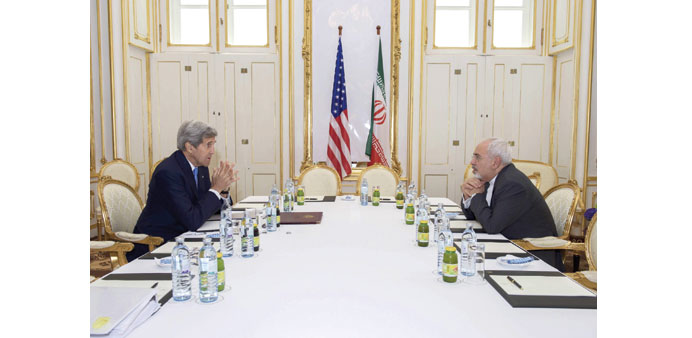AFP
Vienna
Iran and six major powers yesterday gave themselves until July 7 to clinch a historic nuclear deal as a midnight deadline approached in marathon talks with no breakthrough in sight.
Russian Foreign Minister Sergei Lavrov, who joined the talks in Vienna earlier yesterday, said however he believes that, after almost two years of trying, a deal ending the 13-year standoff is “within reach”.
The talks are “progressing in a positive direction. There remain questions, mostly regarding procedural issues rather than technical”, Lavrov told Russian television after meeting US Secretary of State John Kerry.
“We have all reason to believe that results are within reach,” Lavrov said.
US President Barack Obama yesterday reiterated that he would not hesitate to “walk away” from a nuclear deal with Iran if the conditions are not satisfactory.
Obama told reporters that Tehran would have to agree to a “strong, rigorous verification mechanism” on curbing its disputed nuclear programme.
Earlier yesterday Iranian Foreign Minister Mohammad Javad Zarif returned to Vienna following consultations in Tehran, a visit that had raised hopes he may be bringing instructions that would yield a breakthrough.
But after Kerry met with Zarif for almost two hours after his return, the US State Department said the P5+1 group of global powers had agreed to extend the terms of an interim agreement until July 7.
A State Department official said however that this did “not necessarily mean they will go until the 7th or end on the 7th”.
Kerry had also made no plans for when he might leave the Austrian capital.
A member of the Iranian delegation said that “the negotiations will continue beyond June 30 without any precise fixed date”.
Iranian President Hassan Rouhani said a large number of sticking points had been resolved but some remained.
“Some of these can be sorted out in the coming days if there are no excessive demands and if one remains within the framework,” the Isna news agency quoted him as saying.
After one-on-one talks, the top American diplomat and Zarif were joined by their teams for a broader meeting, including with nuclear experts US Energy Secretary Ernest Moniz and Iran’s nuclear chief Ali Akbar Salehi.
The two Massachusetts Institute of Technology alumni played a key role in brokering the outlines of a breakthrough accord in April in Lausanne, Switzerland.
Under the Lausanne framework, Iran agreed to substantially scale down its nuclear activities in order to make any attempt to develop nuclear weapons—an aim denied by Tehran—virtually impossible.
In return, painful sanctions that have suffocated the Iranian economy by choking its lifeblood oil exports and its ability to earn foreign currency will be progressively lifted.
But turning the 505-word joint statement drawn up in a Swiss lakeside hotel into a fully-fledged, highly technical document of several dozen pages and around five annexes has proved hard work.
Contentious issues include the pace and timing of sanctions relief, the mechanism for their “snapback” and Iran’s future development of newer, faster centrifuges.
Another thorny topic is the role of the International Atomic Energy Agency (IAEA) watchdog, whose chief Yukiya Amano met Kerry on Monday and who has been closely involved in the talks.

Kerry meets with Zarif at a hotel in Vienna yesterday.
